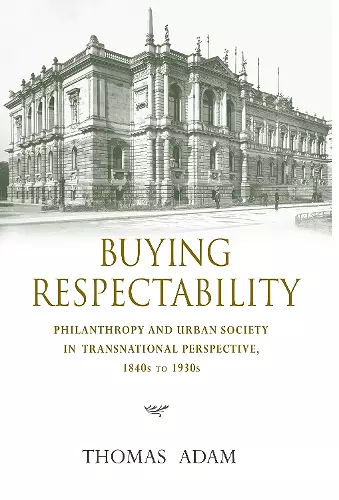Buying Respectability
Philanthropy and Urban Society in Transnational Perspective, 1840s to 1930s
Format:Hardback
Publisher:Indiana University Press
Published:1st Apr '09
Currently unavailable, and unfortunately no date known when it will be back

How newly wealthy Americans gained social status by importing philanthropic innovations from Europe
The process of cultural borrowing and intercultural transfer shaped urban landscapes with the building of libraries, museums, and social housing projects. This book offers a contribution to the field of transnational history, and establishes philanthropy as a prime example of the conversion of economic resources into social and cultural capital.
In 19th-century Leipzig, Toronto, New York, and Boston, a newly emergent group of industrialists and entrepreneurs entered into competition with older established elite groups for social recognition as well as cultural and political leadership. The competition was played out on the field of philanthropy, with the North American community gathering ideas from Europe about the establishment of cultural and public institutions. For example, to secure financing for their new museum, the founders of the Metropolitan Museum of Art organized its membership and fundraising on the model of German art museums. The process of cultural borrowing and intercultural transfer shaped urban landscapes with the building of new libraries, museums, and social housing projects. An important contribution to the relatively new field of transnational history, this book establishes philanthropy as a prime example of the conversion of economic resources into social and cultural capital.
Adam's book . . . has merit in its elucidation of the influences of European social projects upon Americans' conceptions of goals for their own society and the extent to which American implementation of philanthropic programs caused a reconsideration of the means and ends of philanthropic endeavor in Europe. His willingness to conceive of philanthropy as an expression of transatlantic ideas and cultural concerns provides a welcome addition to the historiography of philanthropy.Vol. 96 4, March 2010
-- Mark D. McGarvie * University of Richmond, Richmond, Virginia *This sensible book examines philanthropic networks and cultures in various European and North American cities. Thomas Adam demonstrates the interdependence of seemingly contradictory trends: the intercultural transfer of reform ideas and the use of philanthropy for local prestige and status.Dec. 2010
* Urban History *Adam has pulled together stories that are very much worth telling, and explore significant issues.
-- David C. Hammack * Case Western Reserve University *[Adam] presents a good deal of interesting material, especially on German and North American mutual influences, and correctly positions the book as a contribution to the literature on Atlantic transnational intercultural tradition most tellingly identified by Daniel Rodgers. Adam focuses on traditional categories of philanthropic activity—cultural institutions, housing, women's roles, ethnic-religious orientation. . . . Adam focuses on what the Germans call Stiften—i.e., 'big philanthropy'. . . . — ChoiceFeb. 2010
-- S. N. Katz * Princeton University *[T]his richly documented book offers many new insights into philanthropic activism and urban society between Jacksonianism and the Progressive era.June 2010
* American Historical Review *[This book] is an intricately woven composition . . . Those interested in urban history, the use of philanthropy to create new institutional forms and create opportunities for larger audiences, and the ease with which ideas cross national boundaries to influence decision making in other countries will find this volume informative and thought provoking.
* Nonprofit and Voluntary Sector Quarterly *The field of philanthropy as an avenue of social advancement into the ranks of urban elites will be a familiar theme for most readers, though Adam makes the point particularly effectively...Spring 2011
* Journal of Social HistoISBN: 9780253352743
Dimensions: unknown
Weight: unknown
256 pages